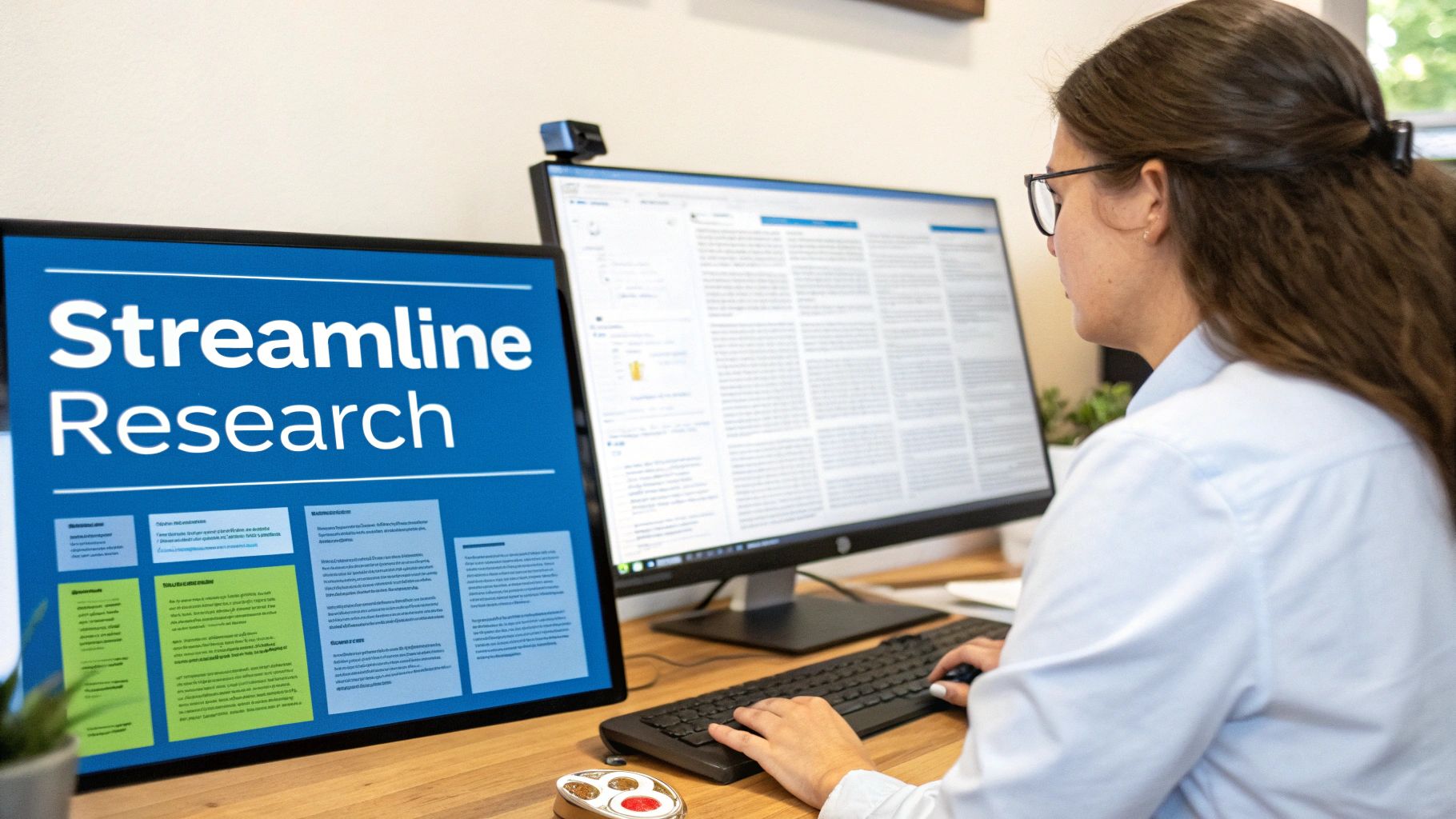The Evolution of Modern Citation Tools

When KnightCite launched in 2004, it marked an important milestone in academic writing – researchers could finally automate the tedious task of formatting citations in major styles like MLA, APA, and Chicago. This simple but powerful tool showed how technology could free scholars from manually formatting references, setting the stage for more advanced citation solutions.
From Basic Formatting to Research Companions
Citation tools have come a long way since those early days. What started as basic formatting utilities have evolved into full research platforms that support the entire academic workflow. Modern citation managers help researchers handle expanding volumes of sources while maintaining accuracy and avoiding plagiarism. As research has grown more complex and interdisciplinary, these tools have adapted to meet changing needs.
For example, managing citations across multiple long-term projects used to be extremely error-prone when done manually. Today's citation platforms automatically extract metadata, check for consistency issues, and even enable collaboration between researchers working on related topics. The ability to easily share citation libraries has created new opportunities for scholarly connection and discovery.
Features That Define the Best Citation Generators
Several key capabilities set current citation tools apart from earlier versions. The automatic extraction of citation data from URLs and DOIs saves significant time while reducing manual entry errors. This allows researchers to quickly add new sources without tedious data entry.
Citation style support has also expanded dramatically. While early tools covered only the most common formats, today's platforms often include thousands of citation styles to serve different disciplines and publication requirements. Many now integrate directly with word processors, letting users insert citations and create bibliographies without leaving their documents. This seamless workflow helps researchers stay focused on their writing.
The Role of Collaboration and Community
The social aspects of modern citation tools have become increasingly valuable to researchers. Zotero, for instance, allows users to follow other scholars, share citation libraries, and discover related work in their fields. This transforms citation managers from isolated utilities into vibrant research communities. Researchers can tap into shared knowledge, stay current with new publications, and build academic networks. The collaborative features help scholars work more effectively together while expanding access to relevant sources and expertise. These social capabilities create a more connected research environment that advances scholarly work.
Breaking Down the Top Citation Generators
Modern research requires managing numerous sources efficiently and accurately. Citation generators have become essential tools that help scholars and students properly credit their sources while saving significant time. Understanding how these tools work and which ones offer the best features can make a big difference in research productivity.
Key Features of Leading Citation Generators
The most effective citation tools share several important capabilities that set them apart. One of the most helpful features is automatic data extraction from URLs and DOIs – this works like having an assistant who instantly pulls all the needed citation details for you. Instead of manually typing out author names, publication dates, and other information for each source, these tools gather it automatically. Modern citation generators also support thousands of citation styles, from common formats like APA and MLA to specialized academic styles, making them useful across different fields and publication requirements.
Evaluating Citation Generator Reliability
When choosing a citation tool, accuracy is essential. Not all generators create equally reliable citations – some consistently meet academic standards while others may introduce errors. For example, Scribbr's Citation Generator is known for its precision, with experts reviewing the citations it produces. This helps prevent lost points from citation mistakes. Even so, it's good practice to double-check generated citations against style guides.
Exploring Popular Citation Generators: Zotero and Mendeley
Among the many citation tools available, Zotero and Mendeley stand out for their comprehensive features. Zotero can instantly create references in over 9,000 citation styles, making it incredibly adaptable. Its integration with Microsoft Word and Google Docs lets users smoothly add citations while writing. Mendeley offers similar capabilities plus collaboration features – researchers can share citation libraries and work together on projects, building academic connections. Learn more in our article about how to master citations and boost your research.
The Impact of Citation Generators on Academic Performance
Using reliable citation tools can noticeably improve academic work. Proper citations prevent unnecessary point deductions, since even small formatting errors can affect grades. The time saved through automation allows more focus on research content, analysis, and developing strong arguments. This efficiency leads to better-quality work and research outcomes overall, benefiting both individual assignments and the broader academic community.

Mastering Advanced Features That Matter
Modern citation generators offer features that make research significantly easier, beyond just creating proper citations. These tools have evolved to help you manage projects, collaborate with others, and stay organized. When you choose the right citation tool, you can focus more on your research and spend less time dealing with administrative tasks.
Automatic Metadata Extraction: The Time-Saving Powerhouse
One of the most helpful features in current citation generators is automatic metadata extraction. When you input a URL or DOI, the tool automatically pulls in all the needed details – author names, publication dates, titles, and more. This means no more manual typing of citation information. For a literature review with 50 sources, what might take several hours to input by hand can be completed in just a few minutes, with fewer chances for errors.
Collaborative Libraries: Sharing Knowledge, Building Networks
Many citation tools now include shared library features, making it simple to work with other researchers on projects. You can create group libraries, share references, and build on each other's research. You might be interested in: How to master citations and boost your research. This shared approach helps researchers access more resources and expert knowledge, leading to stronger research outcomes.
Cross-Platform Synchronization: Access Your Citations Anywhere
The ability to access your citations from any device is another key feature of quality citation tools. Whether you're at your desk, using your laptop in the library, or checking sources on your phone, your citation library stays in sync. For instance, if you find a relevant book while browsing the library stacks, you can add it to your citations right from your phone, and it will be waiting in your library when you return to your computer. This flexibility makes research more efficient and helps you capture important sources whenever you find them.
Building Your Research Network Through Citations

Modern citation tools have evolved beyond simple formatting into platforms that connect researchers and enable collaboration. These tools now make it easier to discover relevant work, connect with peers, and develop professional relationships – all while managing citations. This integration of citation management with networking features creates more opportunities for meaningful research partnerships.
Leveraging Shared Libraries for Collaborative Discovery
Shared libraries are changing how research teams coordinate their work. These centralized collections let team members easily share and access references together. For instance, when working on a literature review, the whole team can contribute to building a comprehensive source library. This ensures everyone has access to the same materials and prevents duplicate work. Large research projects especially benefit from this feature, as it enables real-time updates and smooth coordination between team members.
Following Influential Researchers: Staying at the Forefront of Your Field
Citation tools now include features similar to social media that let users follow other scholars in their field. This makes it simple to track new publications and research developments from leading experts. By monitoring citation activity of key researchers, users can spot emerging research areas and find potential collaborators. The social aspects of citation tools create organic opportunities for professional growth and networking within research communities.
Using Citation Data To Identify Emerging Trends
Citation patterns provide valuable insights into how research topics develop over time. By examining these patterns, researchers can find influential papers and see how ideas spread through their field. Some citation tools include analytics that show these patterns visually, making it easy to identify key publications and themes. This helps researchers make informed choices about their work and understand broader developments in their area. For example, when citations for a particular paper suddenly increase, it may signal growing interest in a new research direction.
Real-World Examples of Collaborative Research Using Citation Generators
The practical impact of collaborative citation features is clear in many research projects. Teams use shared libraries to write papers together, develop literature reviews, and prepare conference materials. Having everyone work from the same reference library makes joint writing smoother and ensures consistent citations throughout. This approach increases transparency and efficiency in research partnerships, leading to stronger final results. Researchers can focus more on their actual research rather than managing citations and references. By enabling better collaboration, modern citation tools are improving how researchers share knowledge and advance their fields.
Ensuring Citation Accuracy Without the Stress
Creating accurate citations is essential for academic work, but it doesn't have to be overly complex. While citation generators handle much of the mechanical work, they work best when combined with careful review. Understanding how to effectively use these tools while catching potential errors helps maintain high academic standards.
Recognizing Potential Problems: Common Citation Errors
Even the best citation tools can miss certain details. Title capitalization often causes confusion – generators may capitalize every word when style guides call for only major words to be capitalized. Publication dates, especially for online sources, frequently contain errors when dates are unclear or missing. Author names may be formatted inconsistently or include unnecessary details. These small issues can add up and impact the credibility of your work if left unchecked.
Implementing Quality Control: Strategies for Accurate Citations
Start by choosing reliable tools like Scribbr that have strong accuracy records. However, the tool is just the first step. Cross-reference the generated citations against official style guides to catch any formatting issues. For instance, when using APA style, check the APA Publication Manual to confirm details. Pay special attention to punctuation and capitalization since these elements often need adjustment. This detailed review process ensures citations fully meet required standards.
Trust But Verify: When and How to Double-Check
While citation generators save significant time, certain sources need extra verification. Government documents and legal cases, for example, have specific formatting needs that automated tools may not handle correctly. Legal citations require precise court information and case numbers formatted in particular ways. For these complex sources, consult specialized guides or ask subject experts to review. Similarly, unique source types like conference presentations or online videos benefit from manual checking against style guides.
Balancing Automation and Manual Review: Finding the Right Approach
The key is finding a workable balance between automated tools and human review. Rather than relying solely on generators or spending excessive time on manual citations, combine both approaches effectively. Start with the generator, then systematically review different source types and elements that commonly need correction, like dates and author names. Check out our guide on how to master citations and boost your research. This balanced method makes the most of automation while maintaining accuracy. Not only does this approach save time, but it also helps researchers develop a better understanding of citation styles through the review process. Building this knowledge improves citation skills naturally over time.
The Future of Research and Citations

Research methods and publishing formats keep changing as academic work evolves. These shifts affect how we cite sources, making it essential for citation tools to adapt. The most effective citation generators don't just respond to changes – they stay ahead of emerging needs. Understanding these developments helps researchers work more efficiently and accurately.
Emerging Trends in Academic Publishing
Open-access publishing has gained significant momentum, making research more widely available while creating new citation challenges. For example, preprints – research papers shared before peer review – have become common practice in many fields. This raises questions about how to properly cite these early-stage papers compared to traditionally published work. Leading citation generators now include specific formats for preprints. The growth of digital archives and databases also means citation tools must expertly pull information from diverse online sources, requiring regular updates to maintain accuracy.
Changes in Citation Requirements
The rules for citations aren't fixed. Major style guides like APA and MLA release updates regularly to match current academic practices. Citation generators need frequent updates to stay current with the latest guidelines. New types of sources, like datasets, software code, and multimedia projects, also create the need for new citation formats. Future tools will need flexibility to handle these diverse materials properly.
Innovations in Research Technology
As artificial intelligence shapes how we find and analyze scholarly work, it opens up new possibilities for citation tools. AI could help identify relevant sources, fill in missing citation details, and spot potential plagiarism issues. Picture a citation tool that not only formats references but also suggests related papers you might have missed based on your topic. This kind of smart assistance would make citation generators true research companions. The key is choosing tools that thoughtfully use new technology to support better research practices. Ready to explore smarter research tools? SmartStudi offers AI-powered features to help streamline your academic work, including an advanced citation generator. Visit their website to see how these tools can improve your research process.
